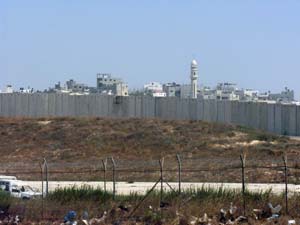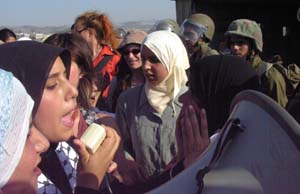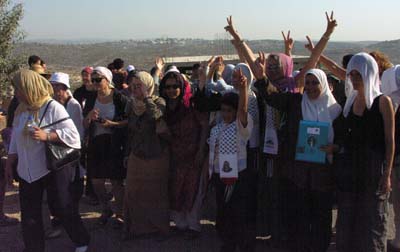|
|
||||||
|
13th
International Conference of Women in Black
Women resisting the Separation Wall
On the morning of August 15th, the little town of Bil'in in the West Bank welcomed 350 women from 44 countries around the world who were participating in the International Women in Black Conference. But there was a definite purpose behind the invitation to visit this small community of 1,600 people, located high up into the very steep and arid mountains, making it difficult to access.
As the group arrived in seven large buses, about 20 women were waiting for them on the outskirts of the town near the local mosque, along with a group of children who were running and jumping around in the crowd, shouting with great excitement. . The objective to receive them was simple and yet very complex. A massive wall of concrete is being constructed by the Israeli government through Bil'in, separating the residents from their lands and community.
Critics of the plan say that contrary to Israel's claim that the purpose of the Wall is to ensure greater security of its citizens, that instead it is about land annexation politics, expansion of the Israeli settlements, and ultimately greater control of the Palestinian population. The plan calls for constructing the Wall through several Palestinian communities, of which the town of Bil'in is one. The community will lose 575 acres from land confiscated for the Wall, much of which provides the livelihood of the inhabitants with olive groves, almond trees and fig trees. Every single resident of the town will lose agricultural land, because it is all located south of the proposed wall. But the people of the town are determined to resist in a nonviolent way, to save their lands and community. . After a warm welcome to the diverse group of visitors by the women of Bi'lin, they all set off toward the new "border" of the town where the Wall will be located, walking along on a narrow road lined by houses of stone and adobe, and olive groves. Shortly they were brought up short with the sight of a huge coil of razor wire across the road, flanked by Israeli soldiers with M-16 rifles. As the crowd walked up to the soldiers, the visitors could see heavy bulldozing equipment ready to dig in the land beyond, which not too long ago belonged to the women and men of the community. In the distance they observed a Jewish settlement, which once the Wall is completed will be expanded to occupy the land of the town of Bil'in. Such land confiscation is occurring throughout the country, with Israel planning to annex a total of 2,565 square kilometers to build the Wall and to create "Closed Zones" (to Palestinians) on the other side, amounting to 45% of the total land of the West Bank.
But after crossing back to
the village side, the demonstrators started back to the village.
But some local women whose patience was exhausted, in an act of
defiance, dragged away the coil of razor wire that divided their
community lands. As the soldiers began to advance, a few boys
threw rocks at them, then ran back toward the town. Soon shots
were heard and tear gas canisters were launched at the crowd in the
village, scattering the demonstrators, visitors and observers. The little community of Bi'lin has become a symbol of peaceful and creative resistance, determined to stop or at least change the plans for the location of the wall, conducting twice weekly protests, often accompanied by international solidarity visitors. All too often the soldiers have reacted far more violently, not only shooting tear gas at the demonstrators, but shooting rubber bullets, sponge bullets, salt bullets and even exposing villagers to a new sound device called "The Scream" that emits a loud siren-like noise that causes dizziness and nausea. The children of the village have been the target of these assaults along with the adults. Despite the military's
aggressive advances, the community is determined to continue its
peaceful resistance. They hope through demonstrations such as the
one on August 15 with the Women in Black to receive ever greater media
coverage and international attention, in order to convince other
governments to pressure Israel to end construction of the Wall and the
occupation. Regardless, the little town of Bi'lin will no longer
be invisible, no longer a remote community alone in its
resistance. And the inhabitants also hope that their resistance
will serve as an inspiration to the many other communities whose lands
are being divided by the wall.
Although the government of Israel defends the construction of the Wall as important for security of its citizens, Palestinian and a growing number of Israeli women and men as well as international activists are determined to stop it, claiming that it only creates greater divisiveness and conflict, and will not help achieve peace in the region. Governments and citizens of a growing number of countries, as well as the UN have condemned the wall. |



